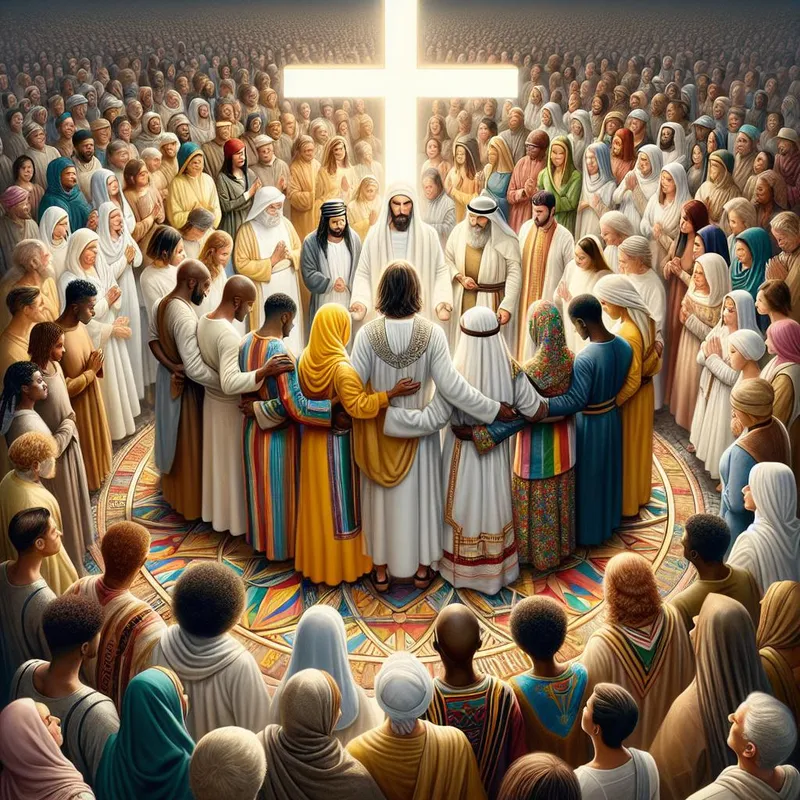
"Biblical Insights on Race: Understanding God's Design for Unity"
Posted on 15 June 2024
What does the Bible say about race?
Race is a topic that has been at the forefront of social and cultural discussions in recent years. It is important for Christians to approach this topic from a biblical perspective, seeking guidance from Scripture. Here are some key questions to consider when exploring the biblical view of race:
1. Does the Bible teach that there are different races?
The Bible teaches that there is only one human race. All people are descended from Adam and Eve, who were created in the image of God (Genesis 1:26-27). The concept of race as we understand it today, with distinct categories based on physical characteristics, is not found in the Bible. Instead, the Bible acknowledges and celebrates the diversity within the human race, including different ethnicities and cultures.
Scripture affirms that all people are equal in value and worth before God, regardless of their ethnicity or background (Galatians 3:28). There is no hierarchy or superiority among races in God's eyes.
2. How does the Bible address racial differences?
While the Bible does not provide a detailed scientific explanation for the variations in physical appearance among different ethnic groups, it acknowledges and celebrates the diversity within humanity. In Acts 17:26, it states that God "made from one man every nation of mankind to live on all the face of the earth." This highlights God's creative intention for diverse ethnicities and cultures.
Rather than focusing on racial differences, the Bible emphasizes unity among believers. Christians are called to love one another, regardless of their ethnic background (John 13:34-35). The apostle Paul reminds believers that they are all part of one body in Christ, with each member having unique gifts and contributions to offer (1 Corinthians 12:12-27).
3. How does the Bible address racial reconciliation?
The Bible teaches that reconciliation and unity among believers is possible through the work of Christ. In Ephesians 2:14-16, Paul writes, "For he himself is our peace, who has made the two groups one and has destroyed the barrier, the dividing wall of hostility." Through Jesus' sacrifice on the cross, believers are reconciled to God and to one another.
As Christians, we are called to be ambassadors of reconciliation (2 Corinthians 5:18-20). This means actively seeking to bridge racial divides, promoting understanding, forgiveness, and love. It requires acknowledging the wrongs of the past and working towards healing and restoration.
4. Does the Bible support a particular view on nationalism or globalism?
The Bible does not explicitly endorse any particular political or social ideology, including nationalism or globalism. However, it does provide principles that can guide our understanding of these issues.
The Bible teaches that all believers are citizens of God's kingdom (Philippians 3:20), and our ultimate allegiance is to Christ. While it is important to honor and respect our earthly citizenships, we should not prioritize any national identity over our identity as followers of Christ.
At the same time, the Bible also emphasizes the importance of caring for our neighbors and being good stewards of the resources God has entrusted to us. This includes showing hospitality to foreigners and welcoming strangers (Leviticus 19:34; Matthew 25:35). As Christians, we should seek to promote justice, peace, and compassion both within our own nations and globally.
5. How should Christians view their own ethnic heritage?
Christians should value and appreciate their own ethnic heritage as part of God's diverse creation. Each culture and ethnicity brings unique contributions to humanity's collective understanding of God and His purposes.
However, it is important to remember that our primary identity as Christians is found in Christ. Our ethnic heritage should not be a source of division or superiority, but rather an opportunity to learn from and celebrate the richness of God's creation.
6. What can we learn from the story of the Tower of Babel?
The story of the Tower of Babel in Genesis 11:1-9 provides insights into God's view on human unity and diversity. In this account, humanity attempts to build a tower that reaches to the heavens in an act of rebellion against God's command to fill the earth.
God responds by confusing their language and scattering them across the earth. This event resulted in the formation of different languages, cultures, and nations. It serves as a reminder that human unity should be grounded in reverence for God and obedience to His commands.
7. How should Christians respond to racial injustice?
As followers of Christ, we are called to pursue justice and righteousness (Micah 6:8). This includes actively opposing and speaking out against racial injustice. We should seek to address systemic issues that perpetuate discrimination and inequality.
Christians should also examine their own hearts and actions, repenting of any prejudices or biases they may have. We should strive to treat all people with dignity, respect, and love, following the example of Jesus.
8. How can Christians promote racial unity?
Promoting racial unity requires intentional efforts towards understanding, empathy, and reconciliation. Here are some practical steps Christians can take:
- Educate yourself: Learn about the history of racial injustice and listen to the experiences of marginalized communities.
- Engage in dialogue: Have meaningful conversations with people from different racial backgrounds, seeking to understand their perspectives.
- Advocate for justice: Speak out against racism and discrimination, supporting policies and initiatives that promote equality and inclusion.
- Foster diverse relationships: Build friendships and relationships with people from different racial backgrounds, celebrating diversity and learning from one another.
- Pray for reconciliation: Pray for healing, understanding, and unity among all races, asking God to guide your own actions and attitudes.
By actively pursuing racial unity, Christians can be a powerful witness to the transformative power of the gospel in a divided world.
